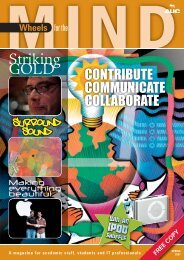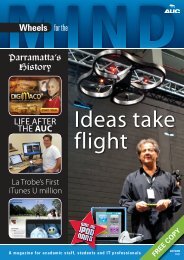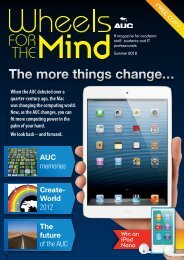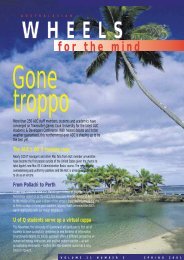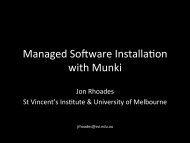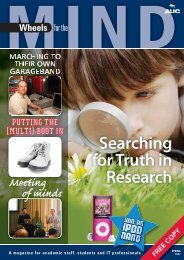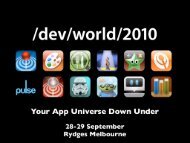for the mind - AUC
for the mind - AUC
for the mind - AUC
Create successful ePaper yourself
Turn your PDF publications into a flip-book with our unique Google optimized e-Paper software.
“We utilise as many opportunities as we can with respect to <strong>the</strong><br />
<strong>AUC</strong>,” he says. “The people on campus who have an interest in<br />
Macs are very keen, and we want to encourage people to use<br />
Macs more in <strong>the</strong>ir teaching.”<br />
Mac advocates are spread across <strong>the</strong> entire university, from<br />
faculties like In<strong>for</strong>matics and Engineering to Education, where<br />
Macs are widely used across IT-oriented UoW research centres<br />
like <strong>the</strong> Research Centre <strong>for</strong> Interactive Learning Environments,<br />
Centre <strong>for</strong> Language Education University of Wollongong,<br />
Educational Media Lab (EMLAB) and Digital Media Centre<br />
(DMC).<br />
“Our whole faculty is a Mac faculty,” says Professor Barry<br />
Harper, Dean of Education and director of <strong>the</strong> DMC. “We’ve done<br />
a lot of projects through <strong>the</strong> <strong>AUC</strong>. It’s a great program that helps<br />
a whole lot of new initiatives get a kick start. We also find that<br />
through <strong>the</strong> program and Apple Australia, we get good links back<br />
to Apple in <strong>the</strong> US. That’s very important to us because to be able<br />
to link into Apple research units means we can feed back ideas<br />
while we’re generating new research directions.”<br />
The DMC’s Investigating Lake Iluka, an interactive simulation <strong>for</strong><br />
teaching ecology to Year 12 students, was one of <strong>the</strong> first <strong>AUC</strong>backed<br />
commercial successes when it was released several years<br />
ago.<br />
These days, UoW researchers are actively engaged in a<br />
number of equally promising projects, many of which have<br />
received AUDF support. One ongoing project is that of Dr Phillip<br />
McKerrow, associate professor in <strong>the</strong> Faculty of In<strong>for</strong>matics’<br />
School of In<strong>for</strong>mation Technology & Computer Science (SITCS).<br />
McKerrow is building a ‘machine vision toolkit’ that will utilise <strong>the</strong><br />
G4’s AltiVec processor to develop commercially relevant methods<br />
<strong>for</strong> computer-based recognition of physical objects.<br />
McKerrow was also one of four UoW researchers, all from<br />
SITCS, to receive grants in <strong>the</strong> latest round of AUDF funding (see<br />
page 5). This year, UoW projects made up four of <strong>the</strong> eleven total<br />
Developer Grants awarded.<br />
Recipients included McKerrow, who will implement an algorithm<br />
he’s developed to improve <strong>the</strong> archiving of massive video files<br />
during Final Cut Pro authoring; computer systems officer David<br />
Vernon, who is building an OS X musical scoring and audio<br />
editing program called Musician; Professor John Fulcher, writing a<br />
speech recognition system designed to bridge <strong>the</strong> gap between<br />
spoken and written word; and Dr Danny Ratner, who wants to out-<br />
Lego Lego by building a computer-programmed radio control kit<br />
enabling students to create and program physical toys and robots.<br />
Such innovative applications continue to define <strong>the</strong> university’s<br />
research focus. EMLAB researchers, <strong>for</strong> example, have recently<br />
turned <strong>the</strong>ir sights to interactive television development, where<br />
<strong>the</strong>y’re using a lab with 10 Macintosh G4 workstations and three<br />
Titanium PowerBooks to investigate new concepts in learning<br />
design. “It’s very much a Macintosh development space,” says<br />
Harper.<br />
Despite <strong>the</strong> growing number of Windows machines at UoW, its<br />
long history as a Mac heartland has earned <strong>the</strong> Mac a<br />
com<strong>for</strong>table position as a key operating plat<strong>for</strong>m where it’s seen<br />
to be most appropriate. That commitment has straddled two<br />
decades and continues as strong as ever. And that’s in large part<br />
thanks to <strong>the</strong> UoW’s close involvement with <strong>the</strong> <strong>AUC</strong>, says Saffioti,<br />
who believes <strong>the</strong> organisation will continue to help <strong>the</strong> Mac win<br />
and keep supporters among <strong>the</strong> <strong>AUC</strong>.<br />
“We do encourage people to take up what <strong>the</strong> <strong>AUC</strong> offers,” he<br />
says. “If we can pick up more people who are passionate about<br />
this kind of stuff, that’s great.”<br />
AUSTRALASIAN WHEELS FOR THE MIND 11



